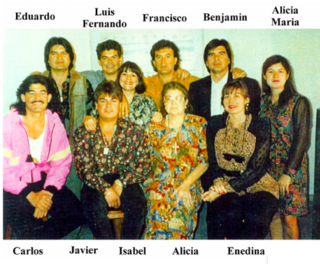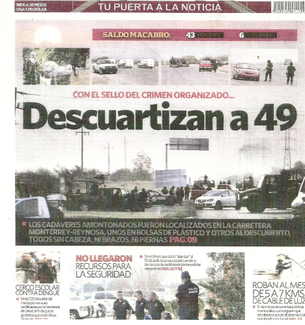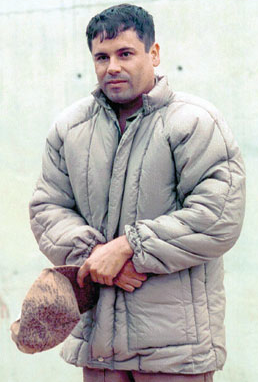Related Research Articles

The Tijuana Cartel or Arellano-Félix-Cartel is a Mexican drug cartel based in Tijuana, Baja California, Mexico. Founded by the Arellano-Félix family, the cartel once was described as "one of the biggest and most violent criminal groups in Mexico". However, since the 2006 Sinaloa Cartel incursion in Baja California and the fall of the Arellano-Félix brothers, the Tijuana Cartel has been reduced to a few cells. In 2016, the organization became known as Cartel Tijuana Nueva Generación and began to align itself under the Jalisco New Generation Cartel, along with Beltrán Leyva Organization (BLO) to create an anti-Sinaloa alliance, in which the Jalisco New Generation Cartel heads. This alliance has since dwindled as the Tijuana, Jalisco New Generation, and Sinaloa cartels all now battle each other for trafficking influence in the city of Tijuana and the region of Baja California.

Los Zetas is a Mexican criminal syndicate, known as one of the most dangerous of Mexico's drug cartels. They are known for engaging in brutally violent "shock and awe" tactics such as beheadings, torture, and indiscriminate murder. While primarily concerned with drug trafficking, the organization also runs profitable sex and gun rackets. Los Zetas also operate through protection rackets, assassinations, extortion, kidnappings and other illegal activities. The organization is based in Nuevo Laredo, Tamaulipas, directly across the border from Laredo, Texas. The origins of Los Zetas date back to the late 1990s, when commandos of the Mexican Army deserted their ranks and began working as the enforcement arm of the Gulf Cartel. In February 2010, Los Zetas broke away and formed their own criminal organization, rivalling the Gulf Cartel.

Joaquín Archivaldo Guzmán Loera, commonly known as "El Chapo" and "JGL", is a Mexican former drug lord and a former leader within the Sinaloa Cartel, an international crime syndicate. He is considered to have been one of the most powerful drug traffickers in the world.

Crime is one of the most urgent concerns facing Mexico, as Mexican drug trafficking rings play a major role in the flow of cocaine, methamphetamine, fentanyl, heroin, and marijuana transiting between Latin America and the United States. Drug trafficking has led to corruption, which has had a deleterious effect on Mexico's Federal Representative Republic. Drug trafficking and organized crime have been a major source of violent crime. Drug cartels and gangs have also branched out to conduct alternative illegal activities for profit, including sex trafficking in Mexico. Some of the most increasingly violent states in Mexico in 2020 included Guanajuato, Zacatecas, Michoacán, Jalisco, and Querétaro. Some of the world's most violent cities are reportedly within the state of Guanajuato with extortion from criminal groups now being commonplace. The state of Zacatecas is said to be valuable to multiple organized crime groups for drug trafficking, specifically methamphetamine to the United States. As of 2021, Michoacán is experiencing increased instances of extortion and kidnapping due to a growing presence and escalation in the armed conflicts between CJNG and Cárteles Unidos on regions bordering the neighboring state of Jalisco. CJNG is also currently battling the Los Chapitos faction of the Sinaloa Cartel in the North Mexican region of Sonora.

The Mexican drug war is an ongoing asymmetric low-intensity conflict between the Mexican government and various drug trafficking syndicates. When the Mexican military intervened in 2006, the government's main objective was to reduce drug-related violence. The Mexican government has asserted that their primary focus is dismantling the cartels and preventing drug trafficking. The conflict has been described as the Mexican theater of the global war on drugs, as led by the United States federal government.

Héctor Luis Palma Salazar, commonly known as "El Güero Palma", is a Mexican former drug trafficker and leader of the Sinaloa Cartel alongside Joaquín "El Chapo" Guzmán and Ismael Zambada García. After the brutal murder of his family ordered by his boss Miguel Ángel Félix Gallardo, Palma engaged in a string of vicious crimes to avenge his lost ones. Palma was arrested on June 23, 1995, and extradited to the United States where he served a jail sentence until June 2016. He was then deported back to Mexico and charged with a double homicide for having murdered two Nayarit police officers back in 1995. Palma is currently incarcerated at the Altiplano Prison, near Mexico City.

Juan José Esparragoza Moreno, commonly referred to by his alias El Azul, was a Mexican drug lord and member of the Sinaloa Cartel, Guadalajara Cartel and Juárez Cartel, three large and powerful criminal organizations. Originally a member of the Dirección Federal de Seguridad (DFS) police agency, he founded the Guadalajara Cartel in the 1970s along with other drug kingpins in Mexico. Following its disintegration in the late 1980s, he went on to lead the Juárez Cartel and eventually settled in the Sinaloa Cartel. He worked alongside Joaquín "El Chapo" Guzmán and Ismael Zambada García, once considered world's most-wanted, powerful and rich drug lords.

The Sinaloa Cartel, also known as the Guzmán-Zambada Organization, the Federation, the Blood Alliance, or the Pacific Cartel, is a large, international organized crime syndicate based in the city of Culiacán, Sinaloa, Mexico that specializes in illegal drug trafficking and money laundering.

Heriberto Lazcano Lazcano, commonly referred to by his aliases Z-3 and El Lazca, was a Mexican drug lord and the leader of Los Zetas drug cartel. He was one of the most-wanted Mexican drug lords.
The Beltrán Leyva Organization (BLO), also known as the Beltrán Leyva Cartel; Spanish: Cártel de los Beltrán Leyva (CBL), was a Mexican drug cartel and organized crime syndicate, formerly headed by the five Beltrán Leyva brothers: Marcos Arturo, Carlos, Alfredo, Mario Alberto, and Héctor. Founded as a Sinaloa Cartel, the Beltrán Leyva cartel was responsible for transportation and wholesaling of cocaine, heroin and marijuana. It controlled numerous drug trafficking corridors, and engaged in human smuggling, money laundering, extortion, kidnapping, murder and gun-running.
La Línea is currently the leading faction of the Juárez Cartel originally designed to be one of the cartel's enforcer units set up by a number of former and active-duty policemen, heavily armed and extensively trained in urban warfare. Their corrupt "line" of policemen were set up to protect drug traffickers, but after forming an alliance with Barrio Azteca to fight off the forces of the Sinaloa Cartel in 2008, they established a foothold in Ciudad Juárez as the enforcement wing of the Juárez cartel. La Línea has also been involved in extortions and kidnappings. As of 2021, La Línea has formed an alliance with the Jalisco New Generation Cartel in Ciudad Juárez to fight off influence and incursions from the Sinaloa Cartel.

Carlos Alberto Arellano Félix is a Mexican medical doctor who is known for his illegal involvement in money laundering for the Tijuana Cartel. Carlos was born on the 20th of August in the year 1955 in the city of Culiacán, Sinaloa. Historian Paul Eiss states that Culiacán is the origin of modern drug trafficking and the home of Mexico's most powerful drug cartel. Carlos is currently working as a licensed surgeon. He finished his surgical training at the Universidad Autónoma de Guadalajara The Tijuana Cartel is an organisation that is notorious for being one of the most well-known drug trafficking groups in Mexico to smuggle goods into the United States. Carlos’ family is made up of seven brothers and four sisters who inherited the Arellano Felix Organisation from their godfather, Miguel Ángel Félix. Despite Carlos’ involvement in money laundering for the Tijuana Cartel, he is one of two brothers who remains free and is not wanted by the United States law enforcement.
Gente Nueva, also known as Los Chapos, in reference to their drug lord Joaquín Guzmán Loera, is a large group of well-trained and experienced gunmen that function as one of the elite armed wings of the Sinaloa Cartel, created to counter, battle and destroy the Juárez Cartel's influence in the Mexican north-west, as well as to battle and destroy La Línea which is currently the Juárez Cartel's largest remaining cell.

The Jalisco New Generation Cartel or CJNG, is a Mexican criminal syndicate, based in Jalisco and headed by Nemesio Oseguera Cervantes. The cartel has been characterized by extreme violence and public relations campaigns. Though the CJNG is known for diversifying into various criminal rackets, drug trafficking remains its most profitable activity. The cartel has been noted for cannibalizing some victims during the training of new sicarios or members, as well as using drones and rocket-propelled grenades to attack enemies.
The 2012 Nuevo Laredo massacres were a series of mass murder attacks between the allied Sinaloa Cartel and Gulf Cartel against Los Zetas in the border city of Nuevo Laredo, Tamaulipas, across the U.S.-Mexico border from Laredo, Texas. The drug-violence in Nuevo Laredo began back in 2003, when the city was controlled by the Gulf Cartel. Most media reports that write about the Mexican Drug War, however, point to 2006 as the start of the drug war. That year is a convenient historical marker because that's when Felipe Calderón took office and carried out an aggressive approach against the cartels. But authors like Ioan Grillo and Sylvia Longmire note that Mexico's drug war actually began at the end of Vicente Fox's administration in 2004, when the first major battle took place in Nuevo Laredo between the Sinaloa Cartel and Los Zetas, who at that time worked as the armed wing of the Gulf Cartel.

The Cadereyta Jiménez massacre occurred on the Fed 40 on 12–13 May 2012. Mexican officials stated that 49 people were decapitated and mutilated by members of Los Zetas drug cartel and dumped by a roadside near the city of Cadereyta Jiménez in northern Mexico. The Blog del Narco, a blog that documents events and people of the Mexican Drug War anonymously, reported that the actual (unofficial) death toll may be more than 68 people. The bodies were found in the town of San Juan in the municipality of Cadereyta Jiménez, Nuevo León at about 4 a.m. on a non-toll highway leading to Reynosa, Tamaulipas. The forty-three men and six women killed had their heads, feet, and hands cut off, making their identification difficult. Those killed also bore signs of torture and were stuffed in plastic bags. The arrested suspects have indicated that the victims were Gulf Cartel members, but the Mexican authorities have not ruled out the possibility that they were U.S.-bound migrants. Four days before this incident, 18 people were found decapitated and dismembered near Mexico's second largest city, Guadalajara.

Joaquín "El Chapo" Guzmán, the former leader of the Sinaloa Cartel, dodged international manhunt for more than a decade after escaping from a maximum-security prison in the Mexican state of Jalisco in 2001. Throughout his criminal career following his escape, Guzmán was pursued all across Mexico and abroad, and went from being an average-level drug lord to arguably the world's most-wanted man. Mexico offered MXN$30 million for his capture, while the United States offered up to US$5 million for information leading to his arrest and conviction. In 1993, he was arrested and imprisoned for murder and drug trafficking, facing a 20-year sentence. Fearing his extradition to the U.S., Guzmán fled from prison by reportedly hiding in a laundry cart in 2001. He quickly reincorporated back in the Sinaloa Cartel while authorities continued their manhunt to re-arrest him.

United States of America v. Joaquín Guzmán Loera was a federal criminal court case against Joaquín "El Chapo" Guzmán, a Mexican drug lord and former leader of the Sinaloa Cartel. Guzmán was extradited from Mexico to the United States in January 2017, where he pleaded not guilty to all counts against him in Brooklyn, New York. His charges included drug trafficking, money laundering, and murder. His defense asserted that he was not the organized crime leader that the prosecution claimed. The trial, often characterized as a trial of the century, began on November 5, 2018, and lasted until February 12, 2019, when the jury returned a verdict of guilty on all counts. He was sentenced on July 17, 2019 to a prison term of life.

Ovidio Guzmán López is a Mexican former drug lord and high-ranking member of the Sinaloa Cartel, a criminal group based in the state of Sinaloa. He is the son of another drug lord Joaquín "El Chapo" Guzmán, once considered Mexico's most-wanted drug lord and the world's most-wanted criminal. Guzmán López was suspected of being a leader within a Sinaloa Cartel faction often referred to as Los Chapitos, Los Menores, and/or Los Juniors.

Iván Archivaldo Guzmán Salazar, also known by his alias "Chapito", is a Mexican drug lord. He is the son of imprisoned trafficker Joaquín "El Chapo" Guzmán, who led the Sinaloa Cartel until his extradition to the United States in 2017.
References
- 1 2 Stewart, Phil (20 June 2007). "Pax Mafiosa leads to fall in Italian mob killings". Reuters . Reuters UK. Retrieved 17 August 2016.
- 1 2 Strong, Gavin (15 October 2013). "Mexico City's Fraying 'Pax Mafiosa'". Forbes. Control Risks. Retrieved 17 August 2016.
- ↑ Vulliamy, Ed (22 February 2014). "Joaquín 'Chapo' Guzmán: the Mexican drug lord adept at playing the system". The Guardian. London. Retrieved 17 August 2016.
- 1 2 3 4 Sample, Kirsten (15 April 2014). "Beware of the Pax Mafioso". Foreign Policy. Retrieved 17 August 2016.
- 1 2 Winslow, Don (9 August 2016). "El Chapo and the Secret History of the Heroin Crisis". Esquire. Retrieved 17 August 2016.
- ↑ Vulliamy, Ed (19 July 2015). "Has 'El Chapo' turned the world's former most dangerous place into a calm city?". The Guardian. Retrieved 17 August 2016.
- ↑ W., T. (2011-01-07). "A pax narcotica?". Economist. Retrieved 3 September 2016.
- ↑ Norton, Adam David (October 12, 2012). "The War on Drugs in Mexico: a failed state?". Third World Quarterly. 33 (9): 1631–1645. doi:10.1080/01436597.2012.720837. S2CID 55998162.